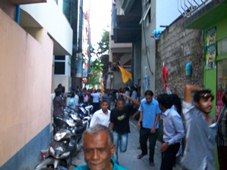The Elections Commission (EC) has forwarded a letter to the Former President Maumoon Abdul requesting he clarify his claim that “election results do not turn out the way people vote”, as the remarks have raised public concerns over the commission’s integrity.
Elections Commission President Fuad Thaufeeq said on Sunday that the commission was “shocked” to hear the remarks and wanted to understand the reasons as to why Gayoom made such a claim.
Fuad said that the comments implying vote rigging have “provided reason for people to look at the commission with doubt” as it came from the former President, who had many supporters and currently leads the third largest political party in Maldives.
“So we have sent a letter to Gayoom today requesting he clarify his remarks” Fuad said.
Gayoom made the remarks at a meeting of the Progressive Party of the Maldives (PPM) on Thursday, after reiterating the PPM interim council’s decision to advice against MP Abdul Raheem Abdulla’s intention to resign and contest for the Laamu Fonadhoo seat on a PPM ticket.
“I know that if he resigns he will be re-elected on a comfortable majority on a PPM ticket,” Gayoom said. “I don’t doubt that at all. However, we know the state of affairs in the country right now – election results do not turn out the way people vote. So what are we going to do?”
Under parliamentary rules of procedure, only parties that contested and won parliamentary elections can be officially represented in parliament.
He added that PPM would be officially recognised by parliament when it resumes in March.
MDP
The ruling Maldivian Democratic Party (MDP) meanwhile released a statement yesterday condemning Gayoom’s remarks, contending that it was an attempt to “bring the Elections Commission, an independent institution, into disrepute, turn the public against it and plunge the nation into a pit of discord and conflict.”
The statement noted that former Elections Commissioners were directly appointed by Gayoom while island chiefs “hovered around ballot boxes.”
Speaking at the MDP headquarters Haruge last night, President Mohamed Nasheed recalled that he was jailed for two years under the previous government for writing about alleged election fraud in a Sri Lankan newspaper.
Nasheed explained that the article pointed out irregularities in the results for a parliamentary election contested by current Vice President Dr Mohamed Waheed and former minister Ilyas Ibrahim, brother-in-law of President Gayoom.
In another election where Nasheed contested a seat in parliament in the late 1990s, “after the ballot box was kept in [presidential retreat] Aarah for three days, the results were announced with 300 votes between myself and [former minister] Abdulla Kamalludeen.”
Under the former government, Nasheed continued, there were cases where “more than double the population was supposed to have voted” and “people whose death had been confirmed was said to have voted.”
PPM rally
At Thursday night’s rally, Gayoom urged supporters to intensify efforts to double party membership ahead of its inaugural national congress in April.
While the EC currently lists the number of PPM members as 13,859 as of December 25, Gayoom revealed that the party was in the process of correcting administrative errors in forms returned by the commission, adding that “the true number of PPM members is over 20,000.”
PPM “is the future of the Maldives,” Gayoom continued, as it is the only party that could foster national unity and “get rid of the conflict, discord and enmity among the people.”
“Our only purpose now, and the focus of all our thought and capabilities, should be winning next year’s presidential election,” he said.
A PPM government would restore national unity, revive the spirit of working together and ensure economic prosperity, Gayoom said.
“Our government will not be one that takes revenge or offers opportunity to only certain people,” he continued. “[Our government] will not defame persons for political ends and expose them in parliament and media. Our government will not give over state assets and property to foreigners. Our government will serve the public in line with Islamic principles and through the democratic process.”
The number of days left “for the formation of this government” is now “765 days,” he said.



